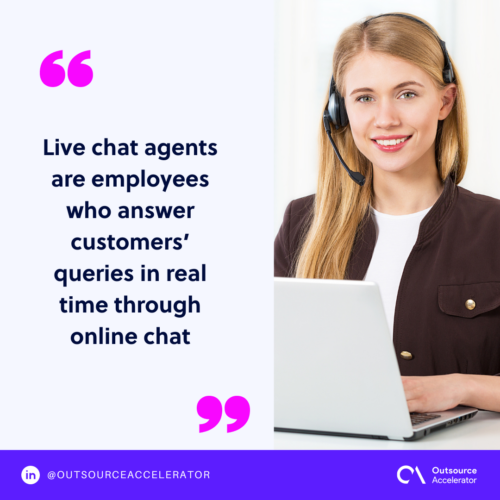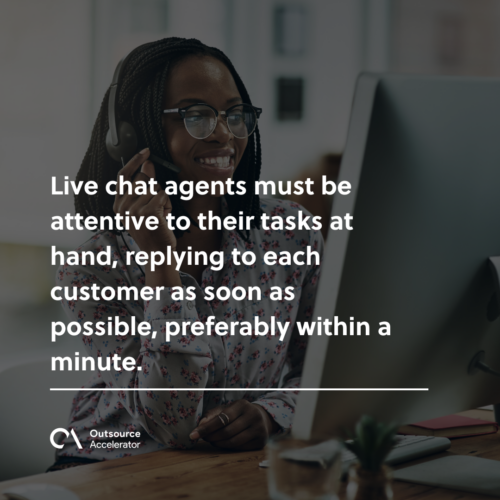Live chat agents: Definition, roles, and key skills

Multiple players in an industry may be competing for market share, but those who offer the best customer service are most likely to succeed.
In the present, consumer interactions are increasingly taking place through online channels.
Therefore, it makes sense that live chat support is one of the contact centers’ and business outsourcing providers’ fastest-growing segments globally.
The growth of live chat support is only expected to pick up and even surpass phone and email support as digitalization spreads across all industries.
To keep up with this, your company will need top-notch live chat agents who are equipped with the necessary abilities and attitudes to handle the demands of the job.
Choosing the right candidates to hire as live chat representatives will ensure that your business can offer quick, convenient, and friendly experiences with live chat that will appeal to today’s clients.
What is a live chat agent?
Live chat agents are employees who answer customers’ queries in real time through online chat.
Even if your company’s live chat software comes with the best automated virtual agents, there are certain situations that create the need for human intervention.
This is where live chat agents come in.
These workers must have excellent communication skills, be quick on the keyboard, be effective multitaskers, and be familiar with both your company’s technology and industry.

The role of live chat agents in your business
A live chat representative essentially converses with and responds to client inquiries. However, they play a more complex role than that.
To understand the significance of live chat agents in your business, let’s examine more of their responsibilities:
Carrying meaningful conversations
An automated live chat program and a chat service with customer service representatives differ by adding a human touch.
Instead of providing monosyllabic responses, live chat agents need to establish the appropriate mood for the conversation.
Up-selling and cross-selling
Online chats can be used effectively as a sales channel as well. A good customer service agent should take advantage of potential cross- and up-selling opportunities.
A live chat agent should be able to plug in additional products at the appropriate time based on customer data points.
For instance, a customer whose question has just been answered is probably feeling good about the business.
A live chat agent should use this opportunity to bring up complementary goods or services as part of the flow of the conversation without coming across as pushy.
Using knowledge of customer pain points
A knowledgeable customer service representative will be able to pinpoint common trigger points for client issues based on previous conversations.
Additionally, they should be able to suggest the best corresponding solutions.
A live chat representative has an obligation to draw on prior experiences, investigate the root of problems, and give customers useful solutions without circling back and forth.
Developing a knowledge base
An agent who regularly communicates with various clients will be aware of all significant issues.
All of this information can then be used by live chat agents to compile customer FAQs that can be included in a knowledge base.
Further, they can develop a successful approach to solutions that future agents can use.
Coordinating improvements
Live chat agents also benefit from their understanding of how customers view various products and services.
A wise business would use this information to improve the efficiency of its operations.
Customer feedback can be shared with other teams, such as the technology, product, marketing, and sales teams.

4 Skills your live chat agents should have
Given the roles and responsibilities shown in the previous section, there are corresponding skills that your live chat agents should have.
In their training curriculum, make sure to include the following:
Excellent online communication skills
As with any other customer service role, great communication is the top skill required from live chat agents.
To manage online chat effectively, an agent must be proficient in written communication.
In line with this, live chat representatives need to have good typing skills. This is required to respond quickly to customers while still being comprehensive.
Empathy and personalization
Empathy is a significant aspect of good communication skills. This helps them identify the best way to talk to customers and resolve their issues.
If customer X is having a bad day, it’s best for agents to stay polite and come to a resolution as soon as possible. And if an agent is joking around with customer Y, it shouldn’t automatically transfer into their conversation with customer Z.
A skill that also comes with this is personalization. Each customer is unique in their own way, and they would appreciate it if they were treated like so.
Train your agents to call customers by their preferred names and titles and to use customer profiles and existing records at their disposal.
Undoubtedly, having live chat agents who have empathy and prioritize personalization will guarantee that customers will walk away from the conversation satisfied and feeling seen.
These are also traits that chat bots can’t emulate well, which makes them some of the most valuable skills that human live chat support representatives can have.
Responsiveness
The goal of live chat support is to give quick, real-time responses to customers who seek it.
Live chat agents must be attentive to their tasks at hand, replying to each customer as soon as possible, preferably within a minute.
Multitasking
Each of your live chat agents will be encountering multiple conversations with different customers simultaneously.
It’s important that they can multitask, which involves having the ability to prioritize as well as memorize and recall.
Train your live chat representatives to prioritize well. For example, if they come across an irate customer, it’s better to resolve their issues promptly to prevent the situation from getting worse.
And with the ability to multitask, live chat agents can strike a good balance between doing this and talking to other customers.
In addition, live chat support agents need to be able to recall the necessary details of each chat as they toggle between them.
An agent can adapt quickly and respond appropriately as the conversation develops by having the ability to recall recent messages quickly.
Without this ability, live chat agents will find themselves repeatedly reading the same conversation, wasting valuable response time.
Further, something that you should also include in training sessions with live chat agents is asking customers for feedback.
Create a short survey form that customers can answer conveniently after interacting with your agents. This helps you and your employees pinpoint qualities to keep and areas that require improvement.

Outsourcing live chat support
For companies looking to boost customer service without having to hire and manage staff internally, outsourcing live chat is a cost-effective option.
By outsourcing live chat support to trusted BPO providers like Cloudstaff, businesses can take advantage of 24/7 access to seasoned customer service representatives who excel at responding to support tickets quickly and personally .
Businesses can also save time and money by outsourcing live chat support instead of recruiting, onboarding, and overseeing their own in-house team of customer service representatives.
Likewise, live chat outsourcing provides adaptable scalability options so you can quickly change your staffing levels in response to demand.







 Independent
Independent




